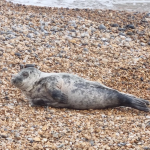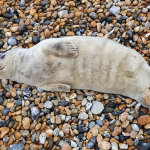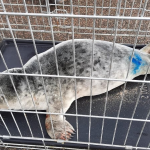As we approach the warmer weather and the later sunsets, we might come across a number of marine wildlife this summer, but what are you supposed to do?
CommunityAd were lucky enough to sit down with Marine Mammal Medic, Jane Davidson, who is currently undertaking a PhD at the University of Kent, to find out more about the work she carries out and her advice for the public in relation to marine wildlife.
Trained and supported by British Divers Marine Life Rescue, a Marine Mammal Medic (MMM) is a trained volunteer who can attend any sightings of cetaceans – seals, whales, dolphins and porpoises – around the UK and respond to phone calls from members of the public 24/7, 365 days a year.
Speaking to CommunityAd, Jane told us: “We get lots of seal call outs in Kent. We have thriving grey and common seal communities. Seals spend as much time on land as in the sea, this is to rest, digest food or to moult. They also leave their young on land while they hunt for fish.
“It’s not unusual to see them on a beach, but human interaction can cause them some issues in terms of disturbance, and subsequent separation. If a beach is busy or people or other animals get too close the seal can re-enter the sea too quickly.
“Call outs always start with watching and assessing from a safe distance. We can check if the seal is a good weight, if it has visible injuries and their respiratory rate from afar. Then we can decide if we need to intervene. During the observation period we can also ensure people and other animals stay a safe distance away.”
What advice would you give to the public when they spot marine mammals on land?
“The BDMLR website has great info and I’d advise putting their phone number in your phone now! BDMLR RESCUE HOTLINE: 01825 765546 (24hr).
“If you find a seal on a beach, watch it from a distance. Do not approach the animal. Finding a seal on the beach does not mean there is necessarily a problem and do not chase it into the sea as this may stop it from doing what it needs to do – rest. A healthy seal should be left alone.
“Do not approach a seal or allow children or dogs near it. Seals are wild animals and although they look cute, they will defend themselves aggressively if necessary. After stormy weather and/or high tides, seals will haul out on beaches to rest and regain their strength.
“Call BDMLR as soon as you discover a cetacean and you are not sure if it is alive. For dead and decomposing cetaceans, please call CSIP, Cetacean Strandings Investigation Programme, on 0800 652 0333.”





